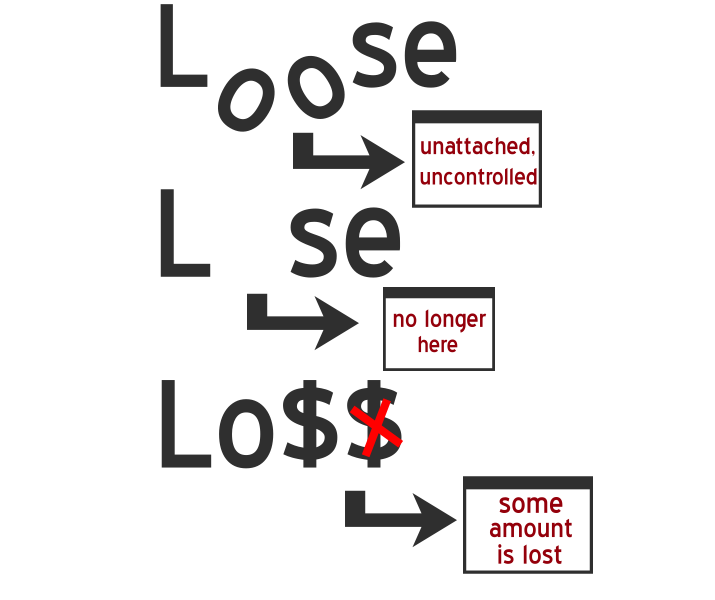The English language is rich and nuanced, often leading to confusion over similar-sounding words or phrases. One such pair that frequently causes mix-ups is "loss" and "lost." While they may seem interchangeable at first glance, they have distinct meanings and usage that are crucial to understand. Grasping the difference between these two terms can improve your communication skills and enhance your writing, allowing for more precise expression of thoughts and emotions.
In this article, we will delve into the meanings, applications, and contexts in which "loss" and "lost" are used. By clarifying these definitions, we aim to provide you with a comprehensive understanding that will help you navigate conversations and written work with greater confidence. Whether you're a student, a professional, or simply someone who loves language, knowing the subtle distinctions between these terms can be incredibly beneficial.
So, what exactly do "loss" and "lost" signify, and how can they affect the clarity of your communication? By exploring these questions in depth, we will ensure that you leave with a clear understanding of how to use each term effectively in various contexts. Let’s embark on this linguistic journey and unlock the secrets behind "loss vs lost."
What is the Definition of Loss?
The term "loss" is generally used as a noun, referring to the state of losing something or someone. It can relate to tangible items, such as losing a possession, or intangible experiences, such as the emotional pain associated with the death of a loved one. Here are some common contexts in which "loss" is used:
- Financial loss: Referring to a decrease in monetary value.
- Loss of life: Pertaining to the death of individuals.
- Loss of opportunity: Missing out on a chance for growth or improvement.
- Emotional loss: Feelings of grief or sadness resulting from the absence of someone or something.
What is the Definition of Lost?
- A lost item: Something that cannot be found.
- Lost in thought: Being distracted or preoccupied with one's own thoughts.
- Lost opportunity: A chance that has been missed.
- Feeling lost: A state of confusion or uncertainty about one's direction or choices.
How are Loss and Lost Related?
While "loss" and "lost" are different parts of speech, they are inherently connected. Their relationship lies in the action of losing something, which leads to a loss. When something is lost, it results in a state of loss. This connection is important for understanding how to use both terms appropriately in sentences.
Can You Use Loss and Lost Interchangeably?
No, "loss" and "lost" cannot be used interchangeably. Doing so can lead to confusion and miscommunication. For example, saying "I have experienced a big lost" is incorrect; the correct phrasing would be "I have experienced a big loss." Understanding the grammatical roles of each term is essential for clear communication.
What are Common Mistakes with Loss vs Lost?
Many people make common mistakes when using "loss" and "lost." Here are some examples to watch out for:
- Confusing "loss" as a verb: "I loss my keys" should be "I lost my keys."
- Using "lost" as a noun: "His lost was painful" should be "His loss was painful."
- Mixing up tenses: "I lose my wallet yesterday" should be "I lost my wallet yesterday."
What is the Emotional Impact of Loss?
Loss can have significant emotional effects, affecting individuals in various ways. Grief, sadness, and even relief can accompany loss, depending on the context. It’s essential to recognize that everyone experiences loss differently, and the emotional impact can vary based on personal circumstances.
How to Cope with Loss?
Coping with loss involves a range of strategies that can help individuals manage their emotions and navigate through difficult times. Here are some effective coping mechanisms:
- Seek support from friends and family.
- Engage in self-care activities, such as exercise and relaxation techniques.
- Consider professional help, like counseling or therapy.
- Allow yourself to grieve and express your feelings openly.
Conclusion: Mastering the Usage of Loss vs Lost
Understanding the differences between "loss" and "lost" is vital for effective communication. By recognizing their definitions and related contexts, you can enhance your language skills and avoid common pitfalls. Remember that while "loss" signifies the state resulting from losing something, "lost" refers to the action of losing. Mastering these terms will not only enrich your vocabulary but also empower you to express yourself more clearly and precisely. As you continue to explore language, let the distinction between "loss vs lost" serve as a reminder of the beauty and complexity of communication.
You Might Also Like
Exploring The June Zodiac Sign: Characteristics And InsightsUnlocking The Mysteries Of The 16th November Star Sign
Keanu Reeves: The Unstoppable Force Of John Wick
Unveiling The Mysteries Of The February 10 Zodiac Sign
Brett Cap And Carli: A Dynamic Duo In The Spotlight
Article Recommendations
- Wanya Morris
- Brian Bosworth
- Corey Harrison
- Val Kilmer Topgun
- Fat Insults To Make Someone Cry
- Liam Payme Gay
- Sophierain Nudes
- Snapgod Lizzy
- Morgan Fille
- Lamine Yamal Son


